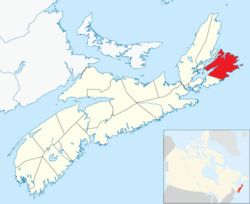Cape Breton County, Nova Scotia
| Cape Breton County | |
|---|---|
| County | |
 Location of Cape Breton County, Nova Scotia |
|
| Coordinates: 46°00′N 60°18′W / 46.0°N 60.3°WCoordinates: 46°00′N 60°18′W / 46.0°N 60.3°W | |
| Country |
|
| Province |
|
| Municipality | Cape Breton Regional Municipality |
| Electoral Districts Federal |
Cape Breton—Canso / Sydney—Victoria |
| Provincial | Cape Breton Centre / Cape Breton North / Cape Breton Nova / Cape Breton South / Cape Breton West / Glace Bay |
| Government | |
| • Mayor-Warden | Cecil Clarke |
| • Council | Cape Breton Regional Council |
| Area | |
| • Total | 2,470.62 km2 (953.91 sq mi) |
| Population (2006) | |
| • Total | 109,330 |
| • Density | 44.3/km2 (115/sq mi) |
| Time zone | AST (UTC-4) |
| Area code(s) | 902 |
| Median Earnings* | $40,451 |
Part of a series about Places in Nova Scotia |
|
Cape Breton County is one of eighteen counties in the Canadian province of Nova Scotia. It is located on Cape Breton Island.
From 1879 to 1995, the area of the county excluded from towns and cities was incorporated as the Municipality of the County of Cape Breton to provide local government services. Since 1995 the only municipality in the county has been a single-tier municipality called Cape Breton Regional Municipality. For statistical purposes, the First Nations reserves of Eskasoni 3 and Membertou 28B are included in the county, but are separate entities.
Taking its name from Cape Breton, the most easterly point of the island which was called after the Bretons of Brittany, the county has what is probably the oldest surviving European name to have been used to designate part of North America.
By proclamation of October 17, 1763 after termination of the Seven Years' War, Cape Breton Island was formally annexed to Nova Scotia. For a time thereafter Cape Breton Island was part of Halifax County. On December 10, 1765, Cape Breton Island was set apart as a separate county under the name Cape Breton County.
From 1784 to 1820, Cape Breton Island was established as a separate colony with a Lieutenant Governor and a nominated Executive Council, but without an elected house of assembly. Not until after Cape Breton Island was re-annexed to Nova Scotia in 1820 did it receive representation in an elected legislature.
Although subdivided into three districts in 1824, Cape Breton County was co-extensive with Cape Breton Island from 1820 to 1835 when the county was divided into three separate and distinct counties:
In 1851, Victoria County was formed out of the northeastern part of Cape Breton County and a year later, in 1852, the present boundaries of Cape Breton County were defined by the colonial government in Halifax.
...
Wikipedia
